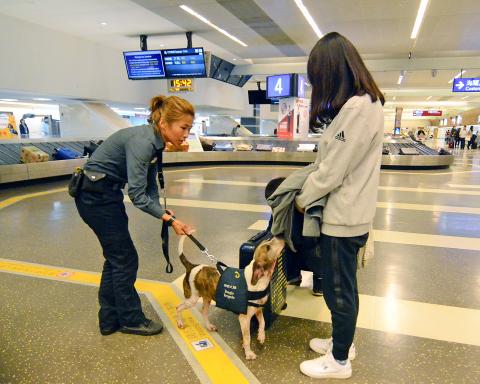The Council of Agriculture (COA) yesterday said it would not ban the use of kitchen waste as pig feed, despite increasing calls from hog farmers and experts for a ban to prevent the transmission of African swine fever.
More than 280 hog farmers on Friday in a joint statement called on the council to prohibit feeding pigs leftovers.
Using leftovers to feed pigs is a backward practice and provides a hotbed for virus transmission, they said, urging the council to protect and upgrade the hog industry.

Photo: CNA
Instead of imposing an immediate ban, the council is encouraging farmers to switch to commercial fodder by providing subsidies and technical assistance, COA Chief Secretary Chang Chih-sheng (張致盛) told a news conference in Taipei.
The council last year identified 2,045 hog farms using leftovers as pig feed, but that number has fallen to 1,776 after the rest had switched to commercial fodder by yesterday, Chang said.
Leftovers are just one channel for virus transmission and the risk can be minimized by heating leftovers to 90°C for at least an hour, as they are required to do, Department of Animal Industry Deputy Director Wang Chung-shu (王忠恕) said.
The council next week would meet with experts and local representatives to further discuss the matter, he added.
Taiwan produced about 970,000 tonnes of leftovers in 2017, of which 770,000 tonnes were used as pig feed, Environmental Protection Administration (EPA) Bureau of Environmental Inspection Deputy Inspector-General Lin Jso-hsiang (林左祥) said.
If feeding kitchen waste to pigs were banned, restaurants and hotels producing more than 16kg of leftovers per day would need to contract firms to process them at disposal fees of NT$2,000 to NT$3,000 (US$64.80 to US$97.20) per tonne, he said.
The nearly 200 firms nationwide that produce more than 1 tonne of leftovers per day are advised to install their own fast-fermenting devices, Lin said, adding that the agency would meet with such businesses next week.
Yunlin County Commissioner Chang Li-shan (張麗善) of the Chinese Nationalist Party (KMT) on Dec. 25 announced a ban on using leftovers as pig feed, making it the first municipality to do so.
The move drew criticism from Premier William Lai (賴清德).
The county produces about 90 tonnes of leftovers every day, which are now sent to local plants for disposal, including Nan Ya Plastics Corp’s recycling plant, Yunlin Environmental Protection Bureau Director Chang Chiao-wei (張喬維) said via telephone yesterday.
The central government should fully support the county’s plan to do so and follow suit by announcing a national ban, he said, asking whether the central government would be ready to tackle all leftovers if the disease enters the nation.
Meanwhile, customs officials had as of Friday intercepted 127 illegal imports of meat products, including 44 pork products from China, since Dec. 18, when it raised fines for first-time offenders to NT$200,000 and repeat offenders to NT$1 million, council data showed.
Chunghwa Post Co yesterday reminded people not to import any meat products from overseas, not to order foreign meat products by mail and not to visit foreign farms.

Alain Robert, known as the "French Spider-Man," praised Alex Honnold as exceptionally well-prepared after the US climber completed a free solo ascent of Taipei 101 yesterday. Robert said Honnold's ascent of the 508m-tall skyscraper in just more than one-and-a-half hours without using safety ropes or equipment was a remarkable achievement. "This is my life," he said in an interview conducted in French, adding that he liked the feeling of being "on the edge of danger." The 63-year-old Frenchman climbed Taipei 101 using ropes in December 2004, taking about four hours to reach the top. On a one-to-10 scale of difficulty, Robert said Taipei 101

Nipah virus infection is to be officially listed as a category 5 notifiable infectious disease in Taiwan in March, while clinical treatment guidelines are being formulated, the Centers for Disease Control (CDC) said yesterday. With Nipah infections being reported in other countries and considering its relatively high fatality rate, the centers on Jan. 16 announced that it would be listed as a notifiable infectious disease to bolster the nation’s systematic early warning system and increase public awareness, the CDC said. Bangladesh reported four fatal cases last year in separate districts, with three linked to raw date palm sap consumption, CDC Epidemic Intelligence

Taiwanese and US defense groups are collaborating to introduce deployable, semi-autonomous manufacturing systems for drones and components in a boost to the nation’s supply chain resilience. Taiwan’s G-Tech Optroelectronics Corp subsidiary GTOC and the US’ Aerkomm Inc on Friday announced an agreement with fellow US-based Firestorm Lab to adopt the latter’s xCell, a technology featuring 3D printers fitted in 6.1m container units. The systems enable aerial platforms and parts to be produced in high volumes from dispersed nodes capable of rapid redeployment, to minimize the risk of enemy strikes and to meet field requirements, they said. Firestorm chief technology officer Ian Muceus said

MORE FALL: An investigation into one of Xi’s key cronies, part of a broader ‘anti-corruption’ drive, indicates that he might have a deep distrust in the military, an expert said China’s latest military purge underscores systemic risks in its shift from collective leadership to sole rule under Chinese President Xi Jinping (習近平), and could disrupt its chain of command and military capabilities, a national security official said yesterday. If decisionmaking within the Chinese Communist Party has become “irrational” under one-man rule, the Taiwan Strait and the regional situation must be approached with extreme caution, given unforeseen risks, they added. The anonymous official made the remarks as China’s Central Military Commission Vice Chairman Zhang Youxia (張又俠) and Joint Staff Department Chief of Staff Liu Zhenli (劉振立) were reportedly being investigated for suspected “serious